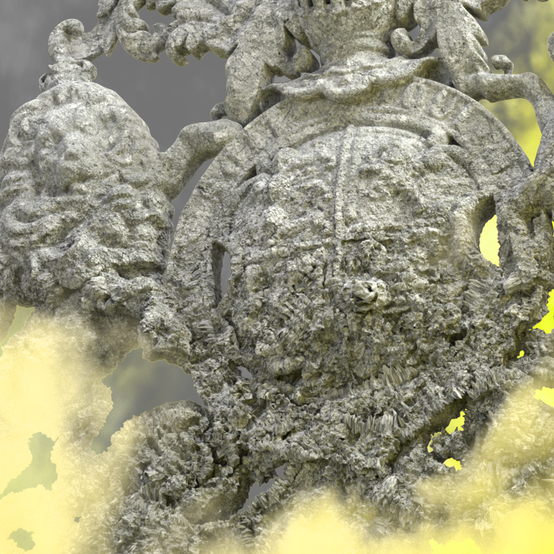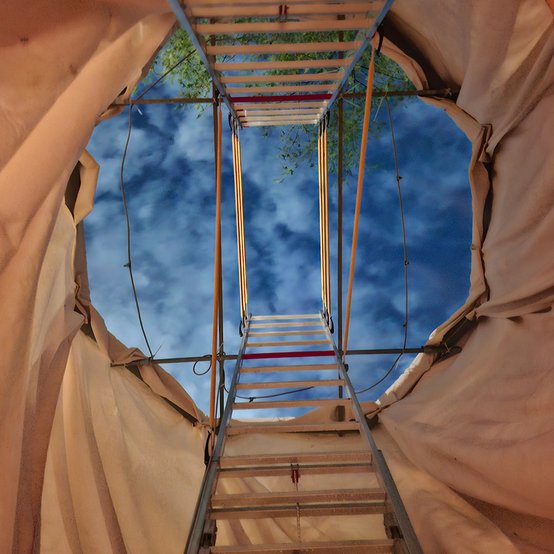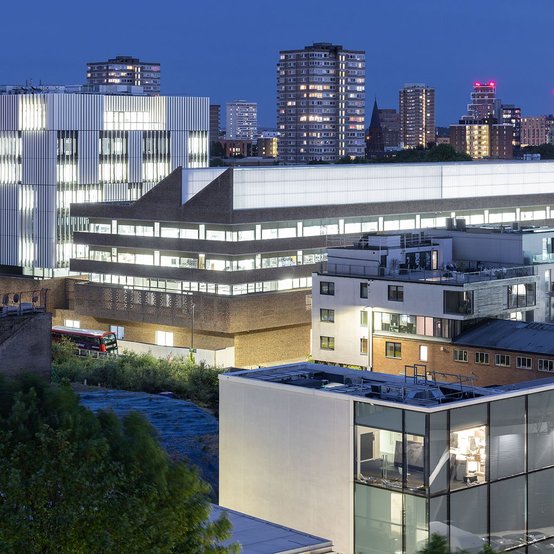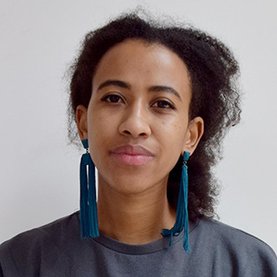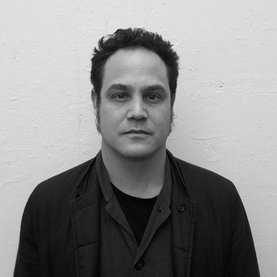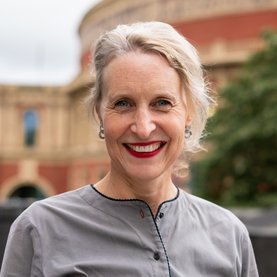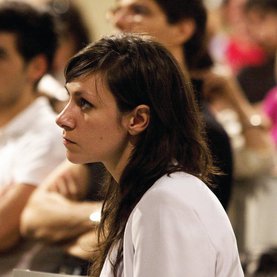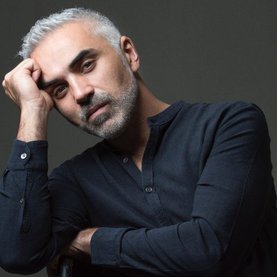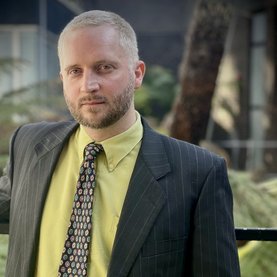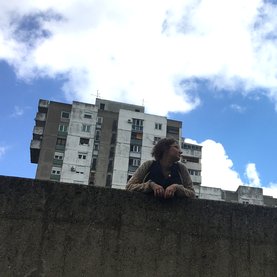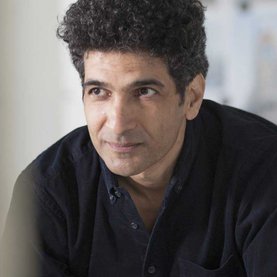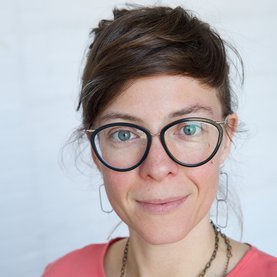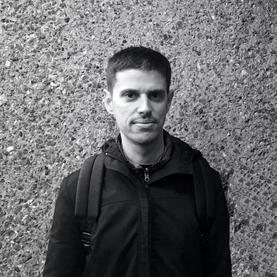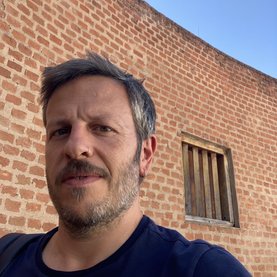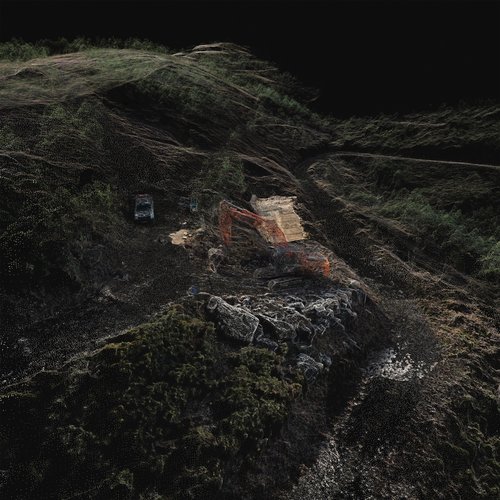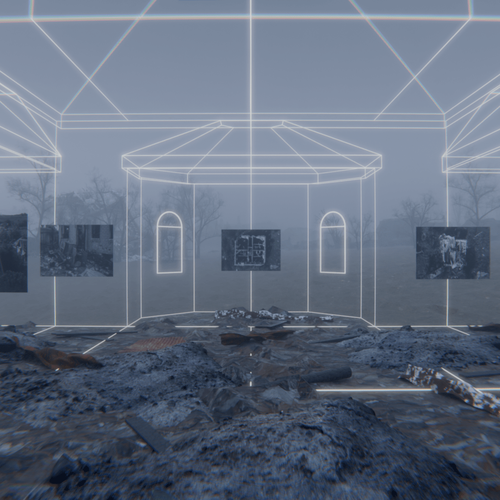
Overview
Reimagine design practice for just transition
Key details
- 180 credits
- 1 (FT) / 2 (PT) year programme
- Full-time or part-time study
School or Centre
Current location
- Kensington
Next open event
- 2 Feb 2026
- Join Online Portfolio Week
Next application deadline
- 17 Mar 2026
- Still accepting applications
Engaging with the built environment in a sustainable way
The MArch Design Practice is a transformative one-year programme for architects, designers, spatial and creative practitioners at any career stage – whether you’re looking to reimagine an established practice, emerging from undergraduate study, or transitioning from other creative, activist or policy-engaged fields.
Leading planetary action
Planetary crisis demands new design thinking. This programme positions students at the intersection of urgent planetary challenges and unprecedented opportunity. You’ll study material processes and innovation, strategies of specification and reuse, embodied carbon and emerging technologies – from critically engaging AI and carbon accounting methods, developing interdisciplinary design strategies and methods of representation, to bio-based materials, and more. You’ll explore how these sites of opportunity intersect with economics, politics, and identity to reshape design practice.
We examine how renewable energy systems, green technologies, and social movements are transforming the built environment. Through critical engagement with construction's planetary impact, you'll develop bold, rigorous design propositions for more equitable futures, for people and planet.
Global perspectives
Drawing on methods and theories from diverse international contexts, we prepare you to deliver renewable and equitable futures around the world. You'll bring your unique cultural perspective and existing practice into dialogue with peers from across the globe.
Students work across a range of media and contexts, including drawing, model-making, moving image, performance, material experimentation, prototyping, digital media, carbon accounting, policy engagement and design detailing.
Individual pathways
This is not a RIBA/ARB validated Part II programme. Our structure offers flexibility for practitioners to tailor their learning to specific goals, whether you're working towards a specialism, developing a research-led practice, or pivoting your career. Students are encouraged to draw on existing practices and experiences, and to use the skills and exposure of the programme to propose interventions into existing architectural models or develop new forms of practice.
You'll take core units in the School of Architecture while choosing from interdisciplinary electives across the Royal College of Art – from digital storytelling to creative pedagogy, investigating the politics of housing, exploring sound design and new media, and more.
You'll develop an independent research project with dedicated one-to-one supervision, supported by intensive research workshops, career development sessions, and CV/application guidance to launch your next chapter. No two student journeys are identical. Each graduate is supported to carve out their own individual trajectory following their time with us on the programme.
Reimagining our worlds
This programme offers a rare opportunity: dedicated time and mentorship to analyse the crises facing the built environment and develop your own tools, methods, and practice models for engaging them. Whether you're two years or twenty years into your career, you'll graduate equipped to lead design toward just futures.
Kensington transformation
We are embarking upon a series of refurbishment works at our Kensington campus.
These involve making essential repairs to some areas of our much-loved heritage buildings and improving our facilities for future generations of RCA students and staff.
Find out more about the project.
Explore further and apply now
Catch the replays from our latest online Open Day.
Watch portfolio advice from the programme team.
Applications are now open for September 2026 entry. Round 2 application deadline: 17 March 2026, 12 noon (UK time). Apply now.
Stories
Gallery
Staff
Facilities
The RCA has facilities at Kensington, Battersea and White City. MArch students will benefit from being supervised by world-leading academics at the forefront of research and practice.
View all facilitiesStudents are encouraged to situate their practice within the wider public and will have access to a ‘Live Room’ to support research, development and dissemination of their work. You will also have access to College-wide workshops on an individually planned and negotiated basis, and in dialogue with programme tutors
What you'll study
Flexibility and choice are at the heart of the offer, with a combination of Core and Elective units enabling you to create a bespoke programme of studies that best suits your approach, context and interests.
What you'll cover
Programme structure: Full time, January entry
This information is subject to validation. Please note for January intake, the programme is is available on a full-time basis only.
The programme's core units will be mainly delivered on campus, with some electives available online. Online resources will further contribute to students' learning.
Spring term
Detailing Risk (15 credits)
Just Transition (15 credits)
Cross-College elective (x2) (15 credits per unit)
Summer term
Independent Research Project (60 credits)
Autumn term
Material Processes (15 credits)
Carbon Economies (15 credits)
Cross-College elective (x2) (15 credits per unit)
The full-time MA is delivered over 45 weeks.
Programme structure: Full time, September entry
The programme's core units will be mainly delivered on campus, with some electives available online. Online resources will further contribute to students' learning.
Autumn term
Material Processes (15 credits)
Carbon Economies (15 credits)
Cross-College elective (x2) (15 credits per unit)
Spring term
Detailing Risk (15 credits)
Just Transition (15 credits)
Cross-College elective (x2) (15 credits per unit)
Summer term
Independent Research Project (60 credits)
The full-time MA is delivered over 45 weeks.
Programme structure: Part time
The programme's core units will be mainly delivered on campus, with some electives available online. Online resources will further contribute to students' learning.
Year One
Autumn term
Material Processes (15 credits)
One cross-College elective (15 credits)
Spring term
Carbon Economies (15 credits)
One cross-College elective (15 credits)
Summer term
Independent Research Project (30 credits)
Year Two
Autumn term
Detailing Risk (15 credits)
One cross-College elective (15 credits)
Spring term
Just Transition (15 credits)
One cross-College elective (15 credits)
Summer term
Independent Research Project (30 credits)
The part-time MA is delivered over 90 weeks.
Core units
Material Processes
This unit critically engages with the materiality of the built environment. The unit builds on physical, aesthetic and structural understandings of materials toward a deeper examination of their complex climatic, cultural, and political properties. The unit equips you with knowledge of wider implications and potential uses of material in architecture and design.
Carbon Economies
Through this unit, you will examine the role of carbon within a globalised building industry. You will explore methods of carbon modelling and accounting, campaigns for divestment and energy reform, and the potential of alternative, renewable energy sources to radically reconfigure practice. You will learn to analyse energy sources and evaluate the spatial implications of their use, and strategically position your practice at the forefront of technical and social changes.
Detailing Risk
The design detail is a site of connection and mediation between different aesthetic, legal, material, structural and energetic requirements. The failure of the detail creates risks that might imperil life or have adverse impacts on human health and well-being. This unit inverts the normative study of design detailing by turning to breakdowns and catastrophes where details, joints and connections have failed, because those failures illuminate problems that may have otherwise remained obscure or badly formulated. Drawing on forensic methods, you will learn to track the network of relations that radiate out from these moments of failure in order to better understand the role of detailing in the context of communal and social risk. Upending the typical design process, you will begin with final construction details and design through disassembly, ‘unbuilding’ failed details to understand their yield points and the underlying conditions of their catastrophic undoing.
Just Transition
This unit requires you to project into possible, just futures and rigorously develop the means of realising the transition to those futures. You will be exposed to the imaginaries, strategies and tactics of climate justice movements that contest and project beyond carbon, and consider the spatial implications of the ideologies and methods of these movements. You will critically engage the worlds these movements seek to bring about and consider how the skills and knowledge of spatial practitioners have a role to contribute in facilitating change. You will work across temporalities, producing Design Policy Proposals that can be implemented in the present that contribute towards operationalising renewable, just futures.
Independent Research Project
The Independent Research Project (IRP) unit comprises a substantial student-led investigation. You will be tutored towards the formulation of a research question, and supported to find appropriate and innovative research methods and documentation. You will be encouraged to draw on their existing contexts and/or develop new sites of practice towards making meaningful contributions to knowledge on climate and the built environment.
The MArch in Design Practice offers you the opportunity to engage the social and political systems underlying the climate crisis by design. You will be equipped to understand, analyse and contend with these systems and supported to develop propositions which seek to creatively and constructively bring about change.
College-wide Electives
Autumn terms (September – December)
Health and Care: Poetics of Care: to welcome, to love, to recover (15 credits, School of Arts & Humanities)
Sites and Situations – Spatial Feelings (15 credits, School of Arts & Humanities)
Art & the Urban (15 credits, School of Arts & Humanities)
Material Engagements (15 credits, School of Arts & Humanities)
Performing Practice (15 credits, School of Arts & Humanities)
Synthetic Encounters - Shapeshifting the Digital (15 credits, School of Arts & Humanities)
Housing and Social Reproduction (15 credits, School of Architecture)
Mobility and Debility (15 credits, School of Architecture)
Digital Storytelling (15 credits, School of Communication)
Design Ethics: Design for Good Practice (15 credits, School of Communication/School of Design)
Design Innovation: Models and Life Cycle (15 credits, School of Design)
Design Resilience: Future Forecasting (15 credits, School of Design)
Education for Change (15 credits, MEd Creative Education)
Spring terms (January – April)
Curatorial Practices: Curatorial Approaches (15 credits, School of Arts & Humanities)
Synthetic Encounters - Radical Matter: Coded Skins, Sticky Cohesions, Wild Science (15 credits, School of Arts & Humanities)
The Workshop (15 credits, School of Arts & Humanities)
Milieu Milieu Me (The Ecology) (15 credits, School of Architecture)
Capital’s Shadow (15 credits, School of Architecture)
Worldbuilding (15 credits, School of Communication)
Interventions (15 credits, School of Communication)
Design Ethics: Design for Responsible Behaviour (15 credits, School of Communication/School of Design)
Design Innovation: Venture Creation (15 credits, School of Design)
Design Resilience: Sustainability (15 credits, School of Design)
Introduction to Design-Led Robotics (15 credits, School of Design)
Making Pedagogies (15 credits, MEd Creative Education)
Requirements
What you need to know before you apply
The programme is aimed both at postgraduate students and mid-career professionals, and offers a balance between core knowledge, elective and collaborative work and a self-defined research project – enabling you to choose your own areas of interest, while developing the skills to implement your ideas.
Candidates are selected entirely on merit, and applications are welcomed from all over the world, as well as from mid-career designers and career changers. The selection criteria considers creativity, imagination and innovation as demonstrated in your portfolio or equivalent professional experience, as well as your potential to benefit from the programme and to achieve the MArch standard overall.
The programme welcomes architects, designers and spatial practitioners from a range of backgrounds, including those from other design disciplines such as sound, moving image or performance, with an interest in the built environment. Applicants from other backgrounds are also welcome, such as practitioners involved in local government, NGOs, journalism and activism.
What's needed from you
Portfolio requirements
Applicants from art, design and architectural backgrounds
Please submit a 10-page PDF portfolio that showcases your skills and motivations as an architect, artist and/or designer. Please include at least three projects you have worked on that are relevant to the programme. Clearly identify your contributions to any collective projects shown.
Please submit a 10-page PDF portfolio that showcases your skills and motivations as an artist and/or designer. Please include at least three different projects you have worked on, and clearly identify your contributions to any collective projects shown.
Applicants from non-portfolio disciplines (e.g. social sciences, sciences, humanities, politics, NGO/development work)
Please provide an illustrated 10-page document of previous work related to the MArch programme's themes. Clearly identify your role and contributions in the work.
Personal statement
Please provide a 300-word written personal statement that addresses the following points:
- Introduce yourself, your interests and your motivations for applying to the Royal College of Art, and to this programme in particular.
- Briefly summarise any educational background and professional experience to date that will support your application.
- Tell us what you want to do in the future.
Your journey: video requirements
You must also submit a short video introducing yourself, how you envisage the programme will allow you to develop as a spatial practitioner, and what contributions it will support you to make in the world.
English-language requirements
If you are not a national of a majority English-speaking country you will need the equivalent of an IELTS Academic or UKVI score of 6.5 overall (with a minimum of 5.5 in every component). Students achieving a grade of at least 6.0, with a grade of 5.5 in the Test of Written English, may be eligible to take the College’s English for Academic Purposes course to enable them to reach the required standard.
You are exempt from this requirement if you have received a 2.1 degree or above from a university in a majority English-speaking nation within the last five years.
If you need a Student Visa to study at the RCA, you will also need to meet the Home Office’s minimum requirements for entry clearance.
Fees & funding
For this programme
Fees for September 2026 entry
Fees for September 2026 entry on this programme are outlined below. From 2021 onward, EU students are classified as Overseas for tuition fee purposes.
Home
Overseas and EU
Deposit
New entrants to the College will be required to pay a non-refundable deposit in order to secure their place. This will be offset against the tuition fees. Deposits for 2026 entry will be confirmed in September 2025; 2025 deposit rates below for reference.
Home
Overseas and EU
Progression discount
For alumni who have completed an RCA Graduate Diploma and progress onto an RCA MA programme, a progression discount of £1,000 is available. For alumni progressing from an RCA Master's to another RCA Master's, a progression discount of £2,000 is available (£1,000 per year for part-time programmes).
Scholarships
Scholarships
Each year, the RCA scholarship programme supports hundreds of students. The following scholarships are confirmed for this programme, with additional awards added throughout the year.
GREAT Scholarship
Eligible programmes: Interior Design MA, City Design MA, Environmental Architecture MA, Ceramics & Glass MA, Contemporary Art Practice MA, Curating Contemporary Art MA, V&A/RCA History of Design MA, Jewellery & Metal MA, Painting MA, Photography MA, Print MA, Sculpture MA, Writing MA, Animation MA, Digital Direction MA, Information Experience Design MA, Visual Communication MA, Design Products MA, Fashion MA, Intelligent Mobility MA, Service Design MA, Textiles MA, Creative Education MEd, Communication MFA, Master of Research RCA MRes, Design Futures MDes, Arts & Humanities MFA, Design Practice MArch
Other criteria: None
Eligible fee status: Overseas fee status
Value: £10,000 toward fees
RCA President & Vice-Chancellor’s International
Eligible programmes: Architecture MA Architecture (ARB/RIBA Part 2), Interior Design MA, City Design MA, Environmental Architecture MA, Ceramics & Glass MA, Contemporary Art Practice MA, Curating Contemporary Art MA, V&A/RCA History of Design MA, Jewellery & Metal MA, Painting MA, Photography MA, Print MA, Sculpture MA, Writing MA, Animation MA, Digital Direction MA, Information Experience Design MA, Visual Communication MA, Design Products MA, Fashion MA, Innovation Design Engineering MA/MSc, Intelligent Mobility MA, Service Design MA, Textiles MA, Creative Education MEd, Communication MFA, Master of Research RCA MRes, Design Futures MDes, Arts & Humanities MFA, Design Practice MArch
Other criteria: Applicants from Australia, Brazil, Canada, Chile, Colombia, Denmark, Egypt, France, Germany, Greece, Hong Kong, India, Indonesia, Israel, Italy, Japan, Malaysia, Mexico, Netherlands, Nigeria, Pakistan, Palestine, Poland, Portugal, Saudi Arabia, Singapore, South Korea, Spain, Switzerland, Taiwan, Thailand, Turkey, UAE, USA
Eligible fee status: Overseas fee status
Value: £9,000 toward fees
RCA President & Vice-Chancellor’s UK Scholarship
Eligible programmes: Architecture MA Architecture (ARB/RIBA Part 2), Interior Design MA, City Design MA, Environmental Architecture MA, Ceramics & Glass MA, Contemporary Art Practice MA, Curating Contemporary Art MA, V&A/RCA History of Design MA, Jewellery & Metal MA, Painting MA, Photography MA, Print MA, Sculpture MA, Writing MA, Animation MA, Digital Direction MA, Information Experience Design MA, Visual Communication MA, Design Products MA, Fashion MA, Innovation Design Engineering MA/MSc, Intelligent Mobility MA, Service Design MA, Textiles MA, Creative Education MEd, Communication MFA, Master of Research RCA MRes, Design Futures MDes, Arts & Humanities MFA, Design Practice MArch
Other criteria: None
Eligible fee status: Home fee status
Value: £5,000 toward fees
The Mohammed bin Rashid Scholarship
Eligible programmes: Interior Design MA, City Design MA, Environmental Architecture MA, Design Practice MArch
Other criteria: 3 places are reserved for employees of Dubai Municipality who apply to the RCA and meet its academic standards, 9 remaining places are open to citizens of the United Arab Emirates, Saudi Arabia, Algeria, Bahrain, Comoros, Djibouti, Egypt, Iraq, Jordan, Kuwait, Lebanon, Libya, Mauritania, Morocco, Oman, Palestine, Qatar, Somalia, Sudan, Syria, Tunisia, and Yemen.
Eligible fee status: Overseas fee status
Value: Fully funded (including fees & maintenance)
The RCA Sanctuary Scholarship
Eligible programmes: Interior Design MA, City Design MA, Environmental Architecture MA, Ceramics & Glass MA, Contemporary Art Practice MA, Curating Contemporary Art MA, V&A/RCA History of Design MA, Jewellery & Metal MA, Painting MA, Photography MA, Print MA, Sculpture MA, Writing MA, Animation MA, Digital Direction MA, Information Experience Design MA, Visual Communication MA, Design Products MA, Fashion MA, Intelligent Mobility MA, Service Design MA, Textiles MA, Creative Education MEd, Communication MFA, Master of Research RCA MRes, Design Futures MDes, Arts & Humanities MFA, Design Practice MArch
Other criteria: None
Eligible fee status: Home or overseas status
Value: Full fees & support package up to the value of £20,000 pa (depending on the awardee’s circumstances)
The Sir Frank Bowling Scholarship
Eligible programmes: Architecture MA Architecture (ARB/RIBA Part 2), Interior Design MA, City Design MA, Environmental Architecture MA, Ceramics & Glass MA, Contemporary Art Practice MA, Curating Contemporary Art MA, V&A/RCA History of Design MA, Jewellery & Metal MA, Painting MA, Photography MA, Print MA, Sculpture MA, Writing MA, Animation MA, Digital Direction MA, Information Experience Design MA, Visual Communication MA, Design Products MA, Fashion MA, Innovation Design Engineering MA/MSc, Intelligent Mobility MA, Service Design MA, Textiles MA, Creative Education MEd, Communication MFA, Master of Research RCA MRes, Design Futures MDes, Arts & Humanities MFA, Design Practice MArch
Other criteria: None
Eligible fee status: Home fee status
Value: Full fees and maintenance
Even if you do not currently see a scholarship for which you meet the eligibility criteria, we encourage you to apply to be considered for financial support.
Unless otherwise stated, you must apply in either round 1 or 2, and have received an offer of study on an RCA programme to be invited to make a scholarship application. Therefore, we strongly recommend you apply for your programme as early as possible but no later than the round 2 deadline.
More information
Additional fees
In addition to your programme fees, please be aware that you may incur other additional costs associated with your study during your time at RCA. Additional costs can include purchases and services (without limitation): costs related to the purchase of books, paints, textiles, wood, metal, plastics and/or other materials in connection with your programme, services related to the use of printing and photocopying, lasercutting, 3D printing and CNC. Costs related to attending compulsory field trips, joining student and sport societies, and your Convocation (graduation) ceremony.
If you wish to find out more about what type of additional costs you may incur while studying on your programme, please contact the Head of your Programme to discuss or ask at an online or in person Open Day.
We provide the RCASHOP online, and at our Kensington and Battersea Campuses – this is open to students and staff of the Royal College of Art only to provide paid for materials to support your studies.
We also provide support to our students who require financial assistance whilst studying, including a dedicated Materials Fund.
Experience
The social media content shown here reflects past and current student activity and is provided for illustrative purposes only. Experiences on the programme may vary and are subject to change for future students.
Start your application
Change your life and be here in 2026. Applications now open.
The Royal College of Art welcomes applicants from all over the world.
Before you begin
Make sure you've read and understood the application process and deadlines.
Application key datesCheck you the programme-specific entrance and portfolio requirements on the programme page.
Consider attending an Open Event, either online or in person, or watch recordings of previous events.
See upcoming events and recordingsPlease note, all applications must be submitted by 12 noon on the given deadline.
Ask a question
Get in touch if you’d like to find out more or have any questions.


